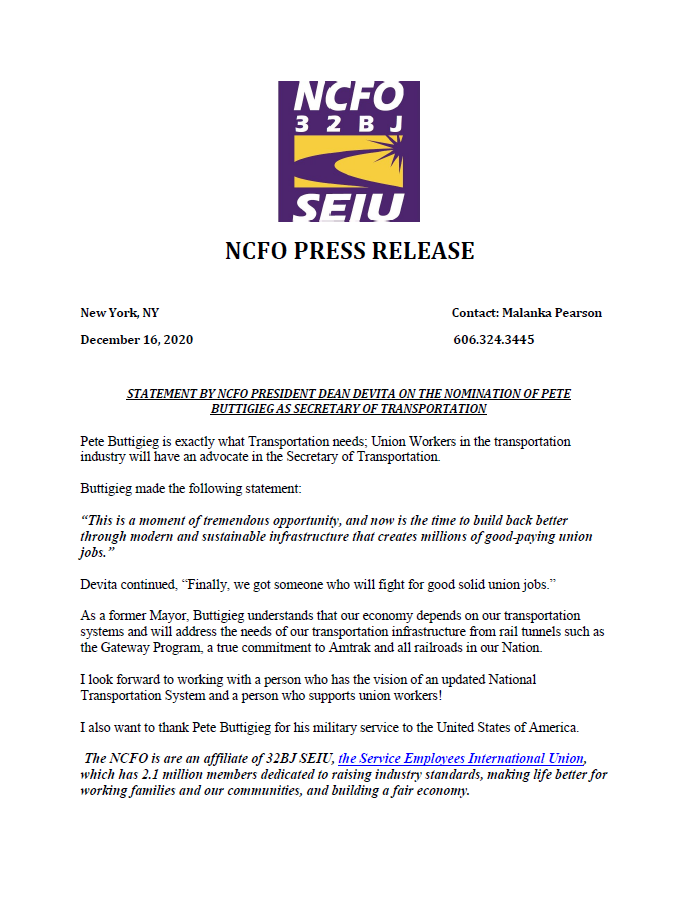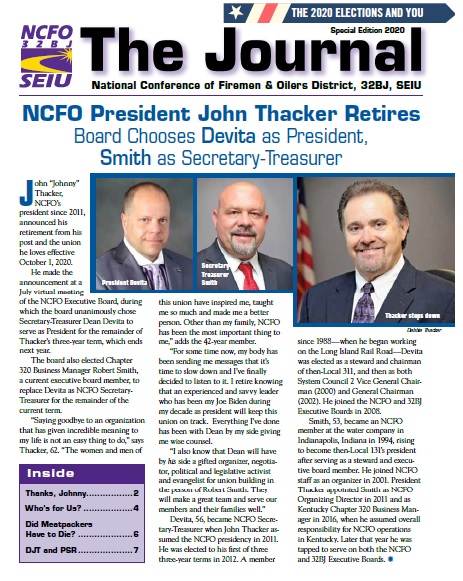January 15, 2021 Washington, DC — Twenty-two transportation labor leaders issue this statement calling on prioritizing safety in advance of the Presidential Inauguration:
“As the elected leaders of transportation unions that collectively represent millions of frontline employees, we are calling on every arm of federal, state, and local government to protect American workers and the public, ensure the orderly and peaceful transfer of power, and safeguard our democracy during the inauguration. While we stand firmly by the rights of every American to have and to share differing points of view, to peaceably assemble in support of those points of view, and to petition the government in hopes of affecting the direction of our country and its policies, these rights do not allow for violent attacks on our fellow Americans or our democratic institutions by domestic terrorists.
“The January 6, 2021 attack on the U.S. Capitol threatened our democracy and thousands of American lives. The actions taken by the individuals who attacked our Capitol, the right-wing militants who led them in doing so, and the elected government officials who enabled and even encouraged them, run counter to the very spirit of democracy and civil society. As a nation, it is incumbent upon each of us to take a firm stand against lawless mob rule by those who seek to upend the American values we hold so very sacred.
“Unfortunately, transportation workers and our passengers—as is too often the case—were placed squarely in harm’s way during, before, and after this repulsive assault on American democracy. We witnessed airline, transit, and rail workers diverted from their public safety duties, threatened and harassed for doing their jobs, and assaulted in the line of duty. These essential workers—already under tremendous strain from the impacts of the ongoing pandemic—have sacrificed in service to our country during this time of our greatest need and it is all of our responsibility to ensure their safety and security. Amid ongoing threats of future violence—including Inauguration Day calls to arms by right-wing militants—frontline transportation workers are left wondering how they can protect themselves, their passengers, and our country going forward. This has gone too far, and it must stop.
“When it comes to our aviation, passenger rail, and transit systems, the working people who maintain and operate them, and the passengers who rely on them, safety must be the priority. There can be no exceptions. We are calling on the Departments of Homeland Security and Transportation, as well as their constituent agencies—in concert with transportation operators and federal, state, and local law enforcement—to use the full weight of the law to ensure safety onboard planes, trains, and buses, and pursue the strongest penalties against passengers who seek to sow chaos or incite violence.
“We stand in solidarity with all transportation workers across America as they continue to place their own well-being on the line in service to our country. We condemn the actions of President Trump, those in Congress who fanned the flames of hate and lawlessness, and every individual whose own actions that day and in the future undermine the rule of law in our democracy.”
| Jerry C. Boles President Brotherhood of Railroad Signalmen | James T. Callahan General President International Union of Operating Engineers | Joe DePete President Air Line Pilots Association, International |
| Dean Devita President National Conference of Firemen & Oilers, SEIU | Jeremy R. Ferguson President International Association of Sheet Metal, Air, Rail and Transportation Workers – Transportation Division | Newton B. Jones International President International Brotherhood of Boilermakers |
| Everett Kelley National President American Federation of Government Employees | Arthur Maratea National President Transportation Communications Union/IAM | Donald Marcus International President International Organization of Masters, Mates & Pilots |
| F. Leo McCann President American Train Dispatchers Association | Sara Nelson International President Association of Flight Attendants-CWA | Sito Pantoja General Vice President, Transportation International Association of Machinists and Aerospace Workers |
| Mike Perrone National President Professional Aviation Safety Specialists | Greg Regan Secretary-Treasurer Transportation Trades Department, AFL-CIO | Paul Rinaldi President National Air Traffic Controllers Association |
| Fredric V. Rolando National President National Association of Letter Carriers | John Samuelsen International President Transport Workers Union of America | Joseph Sellers, Jr. General President International Association of Sheet Metal, Air, Rail and Transportation Workers |
| Christopher M. Shelton President Communications Workers of America | Lonnie R. Stephenson International President International Brotherhood of Electrical Workers | D. Taylor President UNITE HERE International Union |
| Randi Weingarten President American Federation of Teachers |



